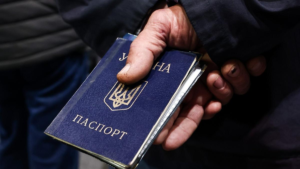18+. Настоящий материал (информация) создан, распространен и (или) направлен иностранным агентом Ганнушкиной Светланой Алексеевной или касается деятельности иностранного агента Ганнушкиной Светланы Алексеевны.
20 марта Владимир Путин signed a decree according to which Ukrainian citizens residing on the territory of Russia must either “legalize” their stay in the country by September 10, 2025, or leave. The document raised many questions: what exactly is meant by legalization, does the decree apply to people living in the so-called new territories, and what should people fleeing from hostilities do when arriving in Russia? “Novaya Gazeta” asked human rights activist Svetlana Gannushkina, head of the committee “Civil Assistance”, which provides assistance to refugees and internally displaced persons, to answer these questions.
– How many people are affected by the decree issued by Vladimir Putin? – The exact number of Ukrainians residing in Russia has never been clearly stated by officials. They have mentioned figures ranging from two and a half million to five million – such discrepancies characterize more the emotional state of the speaker rather than the actual situation. I am inclined to think that there are around two million citizens of Ukraine living in Russia in reality: both those who have been here for a long time and those who were forced to leave the border regions after the events of February 2022. Moreover, those people who left the border regions seem to be divided into two groups by this decree of Vladimir Putin. The residents of four regions that were included in the Constitution of the Russian Federation in October 2022 have been automatically recognized as Russian citizens – they are already, in essence, legalized. The same thing happened with Crimea. When Russia annexed Crimea, all peninsula residents were declared Russian citizens. Then, those who disagreed with what had happened were given time until April 18, 2014, to renounce the Russian citizenship they never voluntarily acquired. And people went to the migration offices, stood in queues to be struck off the list of Russian citizens. It must be understood that one does not necessarily need a passport to become a citizen. The process of obtaining a passport is lengthy.
– However, all residents of these four regions are already considered Russian citizens by the Russian authorities. Even those living in Kherson or Zaporizhia, areas that Russia does not control. On the other hand, residents of, for example, the Kharkiv region, which is not included in the Constitution of the Russian Federation, are not Russian citizens. Some of them, just like residents of Luhansk, fled to Russia. But for the Russian authorities, they are citizens of Ukraine. And Vladimir Putin’s decree on legalization applies to them.
– How can one understand that a person is a resident of these four regions and has already been legalized? – Primarily based on registration. It should be noted that there is experience: the same thing happened in 1992 when the law on Russian citizenship came into force. Who then became Russian citizens? Those who permanently resided on the territory of the Russian Federation. But there is a nuance: what does “permanent residence” mean? Having a permanent registration – that’s good, it’s clear. But what if there is none? In the 90s, there was complete confusion about this: people were given passports, then it turned out that they had no registration, and the passports were taken back. Only in 2002 did an instructive letter from the Supreme Court appear, stating that the fact of permanent residence in the territory of the Russian Federation could be proven in court.
– So, Ukrainian citizens who lived, for example, in Melitopol but did not have registration there, will now have to prove that they are entitled to Russian citizenship if they want to stay in Melitopol? – Yes, if they want to stay there. But I think after the recent nationwide story, the process will be easier. Moreover, the current trend is different: Russian authorities want to grant citizenship to everyone. In the 90s, they did not want to, but now they really want to. These people will have to go to court and based on some documents (such as from their workplace) and witness testimonies, prove that they permanently reside in this territory and have the right to Russian citizenship.
– Alright. What are the options for legalization? – There are various ways of legalization. This includes residency permits, temporary residence permits, and obtaining a temporary stateless person identification card. This also includes seeking asylum, although this institution works poorly in Russia – currently, only 216 people have refugee status. But it is also a way of legalization. In a sense, Putin’s decree looks humane because ideally, if a person is on the country’s territory without legal grounds, they should leave or be deported. However, with this decree, additional time is given for legalization. Nevertheless, it remains to be seen how this decree will be enforced in practice. And whether it will end up aimed at simply deporting all those who currently do not have legal grounds to stay in Russia. It is unclear whether this decree will be for legalization or deportation.
If we look at how the previous decree, No. 1126 (relating to the registry of monitored persons – any foreign nationals residing in Russia without legal grounds who must be legalized by April 30 – I. Z.), is being implemented, it is evident that in some regions, people come for legalization, only to be quickly caught and deported, while in other regions, once they submit an application for legalization, planned deportations are canceled. In one of the regions, I will not name which one, our staff was explicitly told that they did not understand how to work with this registry of monitored persons and therefore, they initially included all foreigners residing in the region in it, and then began to remove them. People’s bank cards were blocked, they could not work or study. That is, there is no clear understanding of the purpose of this decree by Vladimir Putin regarding citizens of Ukraine. I think that this will become clearer when the authorities begin to publish reports on the number of legalized individuals and the number of deportations.
– How easy or difficult is it for Ukrainian citizens to legalize in Russia in general at the moment? Are they subjected to additional checks due to the military conflict between the states? – They are, and quite often. And these checks often appear very unclear and unjustified. This especially relates to checks when entering Russia. For example, a Ukrainian citizen woman who has had a residence permit in Russia since 2017, and has a child and a husband. A completely ordinary family that led an absolutely private life. And then they went on vacation to Antalya. On the way back, the child and husband are allowed in, but she is not. For a day, the father and child wait at the airport: will mom be let in? They eventually go back home. The border service does not allow the mother into Russia and sends her back to Antalya. To Antalya! And she has nothing there in Turkey. And there’s no money either because it has already been spent on vacation. It was only thanks to the fact that we have our contacts in Turkey who set up a small shelter that this woman did not end up in a foreign country without a roof over her head. She lived in this shelter for two months, and then the family was reunited in another country. But fortunately, this woman was known to us, our lawyer helped her obtain a residence permit in Russia. Hence, she wrote to the lawyer, the lawyer contacted me, and I reached out to my colleague in Turkey. But many people do not know anything about us. And how many people have already found themselves in such a terrible situation because of the border service’s refusal to let them into Russia is unknown. There was a case where an 85-year-old grandmother was not allowed in. A student who was studying in Russia. The FSB mainly justifies this by stating that the person “poses a threat to the defense capability of the Russian Federation”. Yes, an 85-year-old woman certainly poses a threat… We write: “Excuse me, but explain what threat this person poses? What basis was this conclusion made on?” The response we receive is: the decision is made directly by the border service officer who checks the documents, and their decision is not subject to appeal. However, lately, responses have been coming in which, among other things, it is stated: “We recommend trying to enter the Russian Federation again after the end of the special operation.” So, you want to ask: “Maybe you know when it will end?” Although they do not guarantee whether the person will be allowed in. Perhaps they will refuse again.
– Besides entry issues, are there any other problems? – Many employers in Russia do not hire Ukrainian citizens. There are no restrictions, but you know – “just in case”. “Today you might be able to, but tomorrow you might not. It’s unknown what consequences I might face for this.” – Is there an understanding of how Putin’s decree will be executed in identifying Ukrainians residing in Russia without legal grounds and their deportations? Because, yes, we know that the police constantly catch migrants from Central Asia in the metro. But they look different from Russians outwardly, so they easily catch the eye of law enforcement. But Ukrainians do not look any different outwardly… – Yes, and nobody catches them in the metro. But they will be identified based on their workplace – a person cannot work without legal status. They will be identified when buying transport tickets. When attempting to rent a house. Of course, if a person stays at home and never goes out, it is impossible to monitor them. But most people live differently. – Another group of people who may be affected by the current presidential decree are Ukrainians living in Russia whose Ukrainian documents are expiring. Getting new Ukrainian documents in Russia today is impossible. Many are afraid to go to Ukraine: firstly, it is unsafe there, and secondly, they will have to return to Russia afterwards… What should these people do? – This is indeed a serious problem. And it is difficult to advise on this matter. There is no single working scheme. In my opinion, there are two options: either acquire Russian citizenship if the person is morally prepared for that, or go to a third country, obtain new Ukrainian documents there, and then try to return to Russia. And as we understand, there is no guarantee that this person will be allowed back into Russia.





